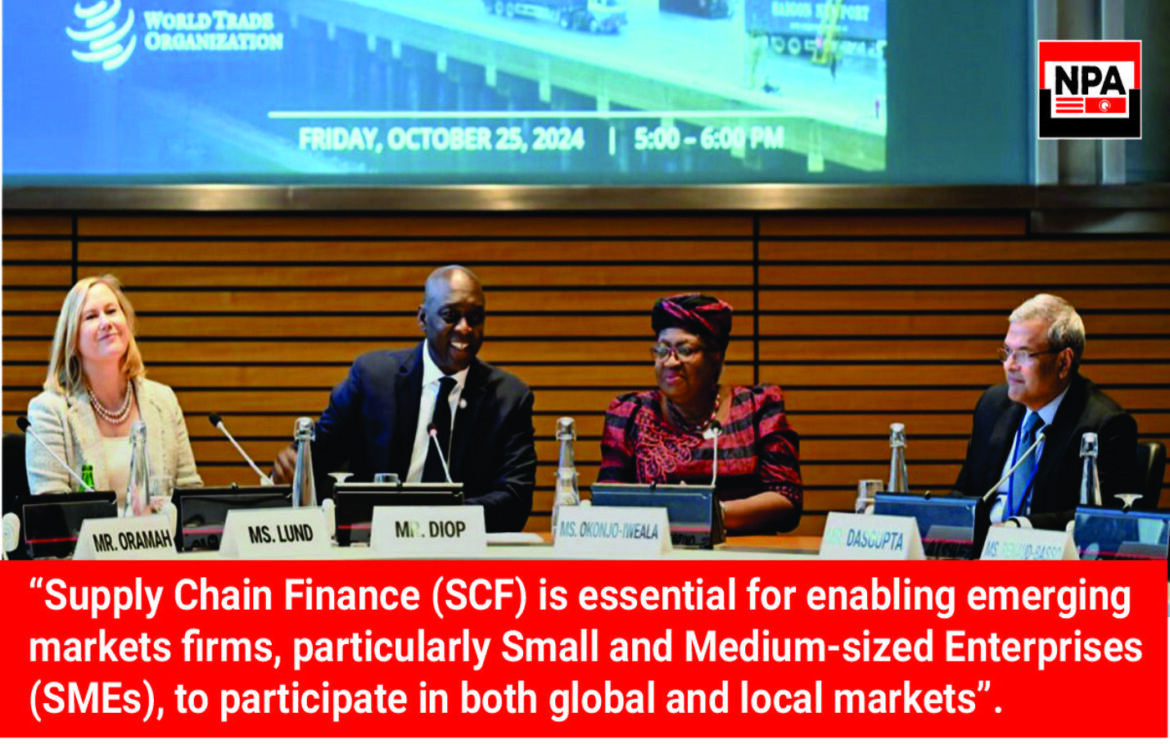The Director-General of the World Trade Organisation, Dr Ngozi Okonjo-Iweala and other heads of multilateral development banks (MDBs) have called on financial institutions to support Supply Chain Finance (SCF) to empower small businesses and boost trade. This involves the unlocking of working capital and easing the financial burden on suppliers in global value chains as well as ‘discounting of suppliers’ invoices by a bank or financier, allowing businesses to borrow against the value of their outstanding invoices’.

Heads of the MDBs made the call during the World Bank Group and International Monetary Fund annual meetings in Washington D.C. on 25 October, an event co-hosted by the IFC Managing Director Makhtar Diop.
WTO’s Director-General, Dr Okonjo-Iweala, emphasised that multilateral development banks have increased trade and supply finance support from US$30 billion annually before the COVID-19 pandemic to nearly US$50 billion in 2023, helping ensure the supply of essential food, medicine and other critical imports. She also pointed out that global supply chain finance, one of the fastest-growing segments of trade finance, is now valued at around US$2.3 trillion.
She also noted that small businesses in developing countries have yet to fully benefit from trade expansions because of challenges such as weak legal frameworks, inadequate technological infrastructure, and high business costs.
Okonjo also noted the need for the multilateral development banks to coordinate activities, focusing on increasing financial support through their existing supply chain finance programmes and taking concrete measures to support the legal, policy and operational framework needed for market development. Besides collaborating with financial institutions to increase the diversity of financing products available to small businesses, which she said will unlock trade volumes, and make it more inclusive and competitive, with the multiplier effect of higher development and poverty reduction outcomes in countries around the world.
Speaking in the same vein, the IFC Managing Director Makhtar Diop highlighted that the “supply chain finance is crucial for empowering emerging market firms, especially SMEs, to engage effectively in both local and global value chains. By providing access to vital financial resources, it enables these businesses to thrive, fostering growth, and generating quality job opportunities,” he said.
Others who shared their efforts in the expansion of supply chain finance are the senior officials from the European Bank for Reconstruction and Development (EBRD), the African Export-Import Bank (Afreximbank), the Asian Development Bank (ADB), the Islamic Development Bank (ISDB), and IDB Invest (the private sector arm of the Inter-American Development Bank).
In a joint statement issued at the end of the meeting, the MDBs pledged to strengthen cooperation and leverage their resources to support SMEs in supply chain, technology infrastructure, analytics, training, and financing.
The statement reads in part: “Supply Chain Finance (SCF) is essential for enabling emerging markets firms, particularly Small and Medium-sized Enterprises (SMEs), to participate in both global and local markets. Greater participation of SME firms in global value chains will increase trade and development opportunities, integrate value chains, and incentivise better environmental and social (E&S) performance.
However, according to the recent studies conducted by the International Finance Corporation (IFC) and the World Trade Organization (WTO), local availability of SCF, especially in low-income and fragile countries, is scarcer than traditional trade finance due to weaker financial and legal infrastructures, leading to missed economic opportunities.
Multilateral Development Banks (MDBs) need to collaborate to further increase financial support, improve regulatory frameworks, promote marketplaces, drive E&S agenda, build market capacity, and increase product availability in supply chain finance markets.
We, the World Trade Organization (WTO), International Finance Corporation (IFC, World Bank Group), African Export-Import Bank (AFREXIMBANK), Asian Development Bank (ADB), European Bank for Reconstruction and Development (EBRD), IDB Invest (IDBI), and International Islamic Trade Finance Corporation (ITFC, Islamic Development Bank Group), will coordinate through the already established Supply Chain Finance Task Force under WTO’s Multilateral Development Banks (MDBs) Working Group to i) increase financial support through their existing SCF programs; ii) strengthen the legal infrastructure; iii) promote common sector-level operating marketplaces; iv) build market awareness and stakeholder capacity; and v) work with financial institutions and fintechs to increase product diversity and availability.



